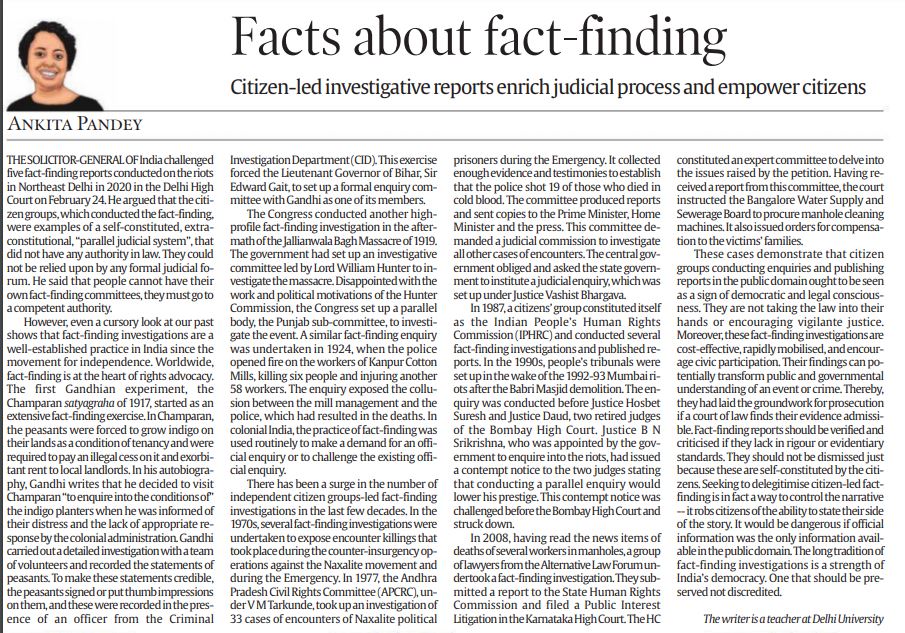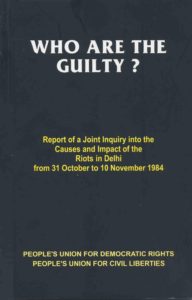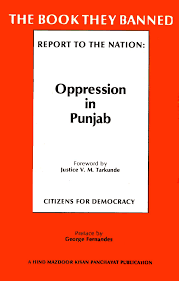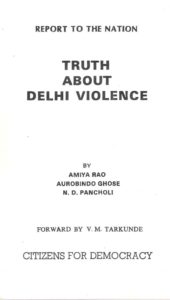Why selective silence about citizen-led fact-finding missions has a role?
Why SELECTIVE SILENCE about citizen-led fact-finding missions has a role in discourse? When an Indian Express columnist chooses to be dishonest blacking out what is too well known and the editors look the other way, then the publication does injustice to the victims of the fact-finding missions ignored by them. WSN editor Jagmohan Singh tears apart the Opinion piece in Indian Express on 21 May as unfair and perfidious. He says that this is also insulting to that section of the journalistic fraternity, even within Indian Express, who ably and boldly exposed the guilty in their investigative reports of such tragedies.
![Why SELECTIVE SILENCE about citizen-led fact-finding missions has a role in discourse? When an Indian Express columnist chooses to be dishonest blacking out what is too well known and the editors look the other way, then the publication does injustice to the victims of the fact-finding missions ignored by them. WSN editor Jagmohan Singh tears apart the Opinion piece in Indian Express on 21 May as unfair and perfidious. He says that this is also insulting to that section of […]](https://www.theworldsikhnews.com/wp-content/uploads/2021/05/Blacking-out-360x203.jpg)
MAKING A CASE FOR THE ROLE OF citizen-led fact-finding missions in democracy, Dr. Ankita Pandey of Delhi’s Indraprastha College, recalls several such missions, including the Gandhi-led Champaran indigo farmers investigation, the Jallianwala Bagh Massacre fact-finding panel of the Congress, the 1924 Kanpur Cotton Mills firing and killings inquiry, the “several fact-finding investigations” into encounter killings in the 1970s “during the counter-insurgency operations against the Naxalite movement and during the Emergency” as well as 1977 Andhra Pradesh Civil Rights Committee’s probe into “33 cases of encounters of Naxalite political prisoners during the Emergency.”

She goes on to mention the “several fact-finding investigations” by the Indian People’s Human Rights Commission (IPHRC) in 1987 and then people’s tribunals work “in the wake of the 1992-93 Mumbai riots after the Babri Masjid demolition.” She did not forget the Alternative Law Forum’s fact-finding investigation in 2008. and goes and on to underline that the findings of such civil society probes “can potentially transform public and governmental understanding of an event or crime.”
How much effort do you think it takes to so scrupulously avoid the most widely known civil society investigation into the 1984 killings of Sikhs in India’s national capital?

How much effort do you think it takes to so scrupulously avoid the most widely known civil society investigation into the 1984 killings of Sikhs in India’s national capital?
Associates in Delhi recalled that in February last year, she delivered a lecture entitled titled “Self Identification of Civil Rights Activists in India” at Ashoka University. There too she had also accidentally forgotten to mention anything about the activism about 1984 killings while tracing the history and trends of civil rights activism from the 1960s to 1980s. When pointed out, her reaction was along the lines of “Oops!”
In her piece on JNU not very long ago, Dr Pandey said the JNU was special, “is different from other institutions,” because it happened to be in Delhi.
“It has a national voice — helped by its location in the national capital, raising uncomfortable questions before governments.”
 Now, you know why the omission of “WHO ARE THE GUILTY?” REPORT is important -simply because the Silence in Delhi Suits Sections of Civil Society, Too.
Now, you know why the omission of “WHO ARE THE GUILTY?” REPORT is important -simply because the Silence in Delhi Suits Sections of Civil Society, Too.
The scholar-columnist of Indian Express will do well to recall that activist N. D. Pancholi -general secretary of Citizens For Democracy was arrested on 10 September 1985 for a report entitled Oppression in Punjab prepared by Amiya Rao, N.D. Pancholi, Aurobindo Ghose, Sunil Bhattacharya and Tejinder Singh Ahuja.
Subsequently, on 13 September, Justice Tarkunde, who had written the Foreword of the report, was also threatened with detention. This well-documented report into the killings in Punjab was proscribed by the Central Government and George Fernandes published it as a Hind Mazdoor Kisan Panchayat publication.
the report, was also threatened with detention. This well-documented report into the killings in Punjab was proscribed by the Central Government and George Fernandes published it as a Hind Mazdoor Kisan Panchayat publication.
 The Citizens for Democracy report -Truth About Violence in Delhi, by the same set of authors, is another report whose omission is conspicuous.
The Citizens for Democracy report -Truth About Violence in Delhi, by the same set of authors, is another report whose omission is conspicuous.
The PUCL-PUDR report-Who Are the Guilty, about the guilty of 1984 killings named names. Some of the top Congress leaders figured in that. In the face of massive pressure, Tarkunde remained steadfast. As did many others, including the great Rajni Kothari.
We don’t expect scholars like her to mention the work of Jaswant Singh Khalra or a Ram Narayan Kumar into forced disappearances in Punjab, but to forget the largest massacre of citizens after 1947, that too, in Delhi, shows meticulous attention to detail.
 To not recall the work of Justice V M Tarkunde and a host of other inspired civil society activists in an article like this requires deliberate effort or criminal negligence. India’s national(istic) civil society is guilty of both, often at the same time. Dr Ankita Pandey’s piece in today’s Indian Express falls in the same box.
To not recall the work of Justice V M Tarkunde and a host of other inspired civil society activists in an article like this requires deliberate effort or criminal negligence. India’s national(istic) civil society is guilty of both, often at the same time. Dr Ankita Pandey’s piece in today’s Indian Express falls in the same box.
We don’t expect scholars like her to mention the work of Jaswant Singh Khalra or a Ram Narayan Kumar into forced disappearances in Punjab, but to forget the largest massacre of citizens after 1947, that too, in Delhi, shows meticulous attention to detail.
In her own words – “Seeking to delegitimize citizen-led fact-finding is in fact a way to control the narrative — it robs citizens of the ability to state their side of the story.”
Oops! Dr Pandey, you just told your own story, too.
Thank you, civil society, and, I forgot to say, Oops!, Shame on the nationalist ones among you. You let down the best amongst us.
